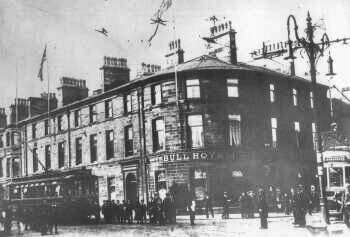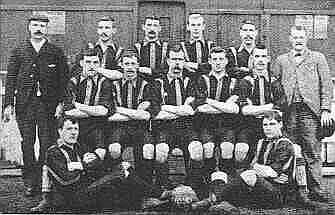|
By the latter half of the 19th century playing and watching ‘football' was becoming increasingly popular as a recreational pursuit but there were many different versions of the game being played. Therefore in 1863 an attempt was made to formalise the rules of the game by a new organisation based in London calling itself the ‘Football Association'. The rules of ‘Association Football' did not allow players to handle or run with the ball and drew a very clear distinction from those that preferred to play rugby football where the use of the hands was still permitted. By 1871 the Rugby Football Union had been formed and had formalised its own rules though, use of the hands apart, the differences between the 2 sports were nowhere near as pronounced as they are today. Both games were called football it just depended on whether you played the game according to 'association rules' or 'rugby rules'.
In Burnley at this time the first organised clubs had decided to play the game according to the rugby rules. It is known that a club called Burnley Rovers played the game in the vicinity of Turf Moor in the 1870's before amalgamating with another club playing at Calder Vale. That organisation disbanded but by 1880 another club calling itself Burnley Rovers and still playing the rugby rules had been formed at the Calder Vale site. It was this relatively small organisation that held a meeting at the Bull Hotel on that fateful evening.
The meeting was reported deep into the following Saturday's edition of the Burnley Express sandwiched between a Court report on a group of 15 weavers trying (unsuccessfully) to sue a mill owner for the recovery of wages they said they were owed and coverage of the Wesleyan Temperance Missions.
It was headlined ‘BURNLEY ROVERS FOOTBALL CLUB' and covered no more than 6 column inches. The report started as follows:
‘A special meeting of this club was held on Thursday evening (18th May 1882) at the Bull Hotel where there was a moderate attendance. The meeting was presided over by Mr. A Birley – The Secretary. Mr G.C. Waddington read the report showing that the club, although so young, now consisted of 90 members.'
Mr A. Baron submitted the balance sheet, which read as follows:
Income £48 12s 6d
Expenditure £56 0s 3d
Loss £8 0s 3d
Mr Baron thought that they had done very well considering ‘the damage they had sustained when the tent had blown away and the bridge was washed away.' Messrs Kilby and Watson should think themselves lucky that they don't have to deal with such disasters especially when one considers that the £15 it required to put right the damage turned a profit into a loss. The significant thing to note is that even in those very early days when football was being discussed, the subject of money took a higher place on the agenda than matters on the pitch.
In fact buried in the middle of the report came this: ‘Mr Bradshaw moved that the recommendation of the committee that the club in future play under association rules be adopted. Mr Barratt seconded the motion which was carried.' Just one simple sentence that announced to the world that a club carrying the name of the town would play ‘Association Football' but that was enough to mark the very birth of Burnley Football Club.
One presumes that had the vote been unanimous then the report would have said so and it seems that the change might not have been popular with everyone but the deed was done.
|
Although he is not mentioned it is known that Arthur's younger brother Charles also attended the meeting (he joined the committee soon after) and it was he who was probably more responsible than anyone for the early administration and consolidation of the club. It was a measure if the ability of Charles in these matters that he would go on to become the President of the Football League.
With the club formed and playing to the right set of rules the detail was worked out in the following 12 months. Over the summer of 1882 the ‘Rovers' tag was dropped and the first proper matches were arranged. In the spring of 1883 the club was invited to take over premises next to the Cricket Club at Turf Moor and matches were played in front of crowds often numbering several thousands.
When one thinks of Burnley Football Club it is easy to concentrate on the modern game and think of who has achieved what for the club in the last, 5, 10, 20, or maybe 40 years but one thing is for certain and that is that those present at the very founding of the club should not be forgotten.


